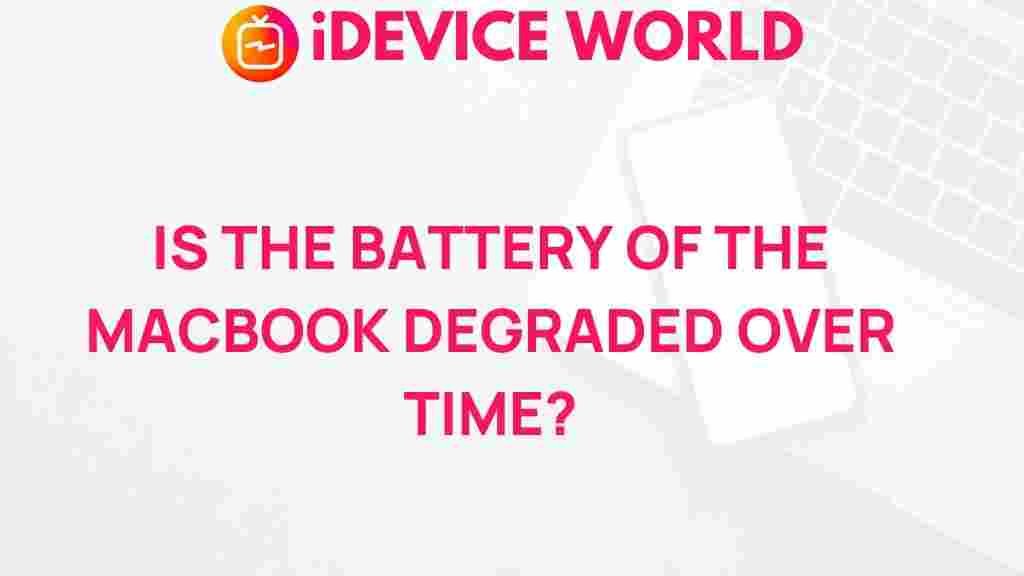MacBook Battery Degradation: Uncovering the Truth
The MacBook has become an essential tool for millions of users around the world, known for its sleek design, robust performance, and impressive battery life. However, one issue that often surfaces among users is battery degradation. Understanding this phenomenon is crucial for maintaining optimal performance and longevity of your device. In this article, we will delve into the truth about MacBook battery degradation, exploring its causes, effects, and how you can manage it effectively.
Understanding Battery Degradation
Battery degradation refers to the gradual decline in a battery’s capacity to hold a charge over time. This is a natural process that affects all lithium-ion batteries, including those used in MacBooks. As you use your MacBook, the battery undergoes chemical reactions that can lead to a reduction in its ability to hold a charge.
What Causes MacBook Battery Degradation?
Several factors contribute to the degradation of your MacBook’s battery, including:
- Cycling: Each time you charge and discharge your battery, it counts as a cycle. MacBook batteries are designed for a certain number of cycles (usually around 1000). After this point, you’ll notice a significant drop in performance.
- Heat: Excessive heat can harm battery health. Operating your MacBook in hot environments or placing it on heat-retaining surfaces can accelerate degradation.
- Age: Even if not in use, batteries naturally lose their capacity over time due to chemical aging processes.
- Charge Levels: Frequently keeping your battery at 100% or letting it drain completely can also affect its lifespan.
Signs of Battery Degradation
Identifying the signs of battery degradation early can help you take the necessary steps to mitigate its effects. Here are some common indicators:
- Shorter battery life than when the MacBook was new.
- The battery drains quickly during use.
- The MacBook unexpectedly shuts down even when the battery indicator shows a charge.
- Charging takes longer than usual.
How to Check Your MacBook’s Battery Health
To manage battery degradation effectively, it’s essential to check your MacBook’s battery health regularly. Follow these steps:
- Click on the Apple icon in the top-left corner of your screen.
- Select About This Mac.
- Click on System Report.
- In the left sidebar, click on Power.
- Look for the Cycle Count and Condition of your battery. The condition will typically say “Normal,” “Replace Soon,” “Replace Now,” or “Service Battery.”
Steps to Improve MacBook Battery Longevity
Here are several strategies to help prolong your MacBook’s battery life:
- Avoid Extreme Temperatures: Keep your MacBook in a temperature range of 32° to 95° F (0° to 35° C).
- Charge Smart: Try to keep your battery charged between 20% and 80% for optimal health.
- Reduce Brightness: Lowering your screen brightness can significantly save battery life.
- Manage Applications: Close unnecessary applications that consume battery power.
- Enable Battery Saver Mode: Use the battery saver mode in your MacBook’s settings to conserve energy.
Troubleshooting Battery Issues
If you are experiencing issues with your MacBook battery, here are some troubleshooting tips:
- Reset the System Management Controller (SMC): This can help resolve battery-related issues.
- Update macOS: Ensure your operating system is up to date, as updates often include optimizations for battery performance.
- Run Apple Diagnostics: This can help identify hardware issues related to your battery.
To reset the SMC on most MacBooks:
- Shut down your MacBook.
- Press and hold the Shift, Control, Option, and Power buttons for 10 seconds.
- Release all buttons and turn your MacBook back on.
When to Replace Your MacBook Battery
If your MacBook’s battery health shows signs of significant degradation (like a high cycle count and poor condition), it may be time to consider a replacement. You can replace the battery yourself if you have the technical skills or take it to an authorized service provider.
For guidance on how to replace your MacBook battery, you can visit Apple’s official support page for instructions and resources.
Conclusion
Understanding MacBook battery degradation is essential for every user aiming to extend the life and performance of their device. By recognizing the signs of degradation, monitoring battery health, and following best practices for battery maintenance, you can significantly enhance your MacBook’s longevity. If you encounter severe battery issues, don’t hesitate to consult with professionals or consider a battery replacement.
By taking proactive measures, you can enjoy the benefits of your MacBook for many years to come. Remember, a well-maintained battery not only improves performance but also enhances your overall user experience.
For more insights on maximizing your MacBook’s performance, check out our other articles on battery management and system optimization!
This article is in the category Reviews and created by iDeciveWorld Team
